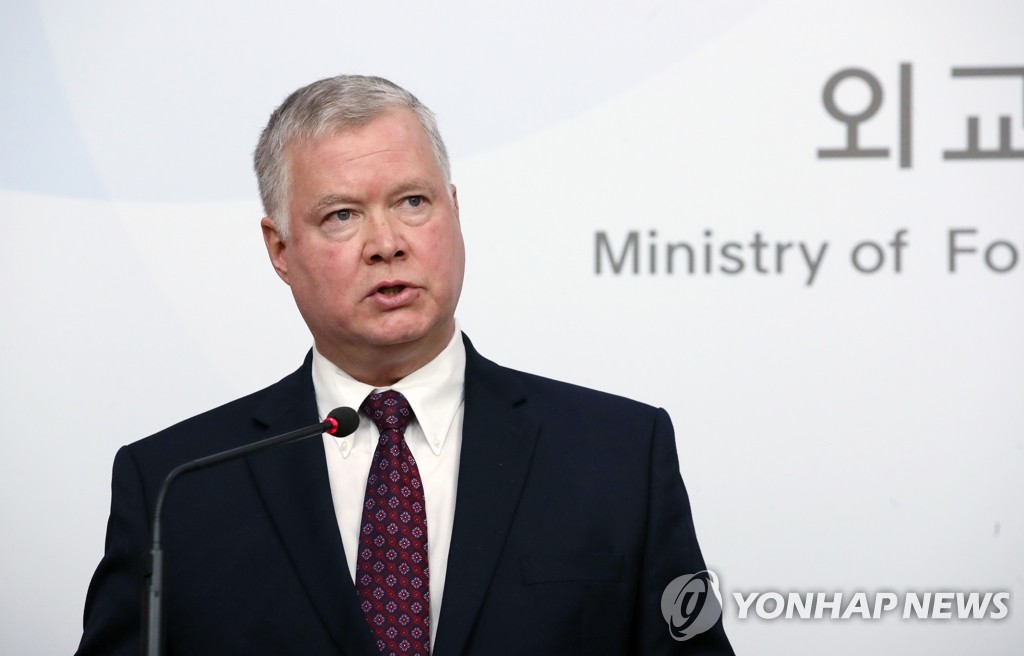- California Assembly OKs highest minimum wage in nation
- S. Korea unveils first graphic cigarette warnings
- US joins with South Korea, Japan in bid to deter North Korea
- LPGA golfer Chun In-gee finally back in action
- S. Korea won’t be top seed in final World Cup qualification round
- US men’s soccer misses 2nd straight Olympics
- US back on track in qualifying with 4-0 win over Guatemala
- High-intensity workout injuries spawn cottage industry
- CDC expands range of Zika mosquitoes into parts of Northeast
- Who knew? ‘The Walking Dead’ is helping families connect
Biegun says U.S. has no deadline on nuke talks, offers to hold talks with N.K.
The United States has no deadline on nuclear negotiations with North Korea, its top envoy for the communist nation said Monday, emphatically offering to meet his counterparts from the North while he is in Seoul.
U.S. Special Representative for North Korea Stephen Biegun also stressed that Washington will not give up, as Pyongyang has been threatening to take a “new way” if Washington does not make concessions before the North’s self-imposed year-end deadline.
Biegun arrived here for a three-day visit on Sunday amid heightened tensions due to the North’s apparent rocket engine tests that raised concerns that it could launch a long-range rocket if the deadline is not met.
“It’s been a long year and we have not made nearly as much progress as we would have hoped. But we will not give up,” Biegun told reporters after meeting with his South Korean counterpart Lee Do-hoon.

U.S. Special Representative for North Korea Stephen Biegun speaks during a press meeting at the foreign ministry in Seoul on Dec. 16, 2019. (Yonhap)
“Let me be absolutely clear. The U.S. does not have a deadline. We have a goal to fulfill the commitments the two leaders made during their historic summit meeting in Singapore,” he added.
He was referring to the first-ever summit between U.S. President Donald Trump and North Korean leader Kim Jong-un in Singapore in June last year.
At the summit, the leaders agreed to seek to build new bilateral relations, make joint efforts to build a lasting and stable peace regime on the peninsula and work toward the complete denuclearization of the peninsula.
Biegun also pointed out his team’s readiness to resume negotiations with the North, saying the U.S. has offered to the North a number of creative ways to proceed with “feasible steps and flexibility” to reach “balanced” agreements.
He did not elaborate on these steps, which appeared to have been put forward during his last negotiation with the North in Sweden in October.
“I remain confident that all of this is possible. I believe we can do this, but the U.S. cannot do it alone,” he said.
“It is time for us to do our jobs. Let’s get this done. We are here and you know how to reach us,” he said.
In addition, the U.S. official warned against any provocations by the North.
“We are fully aware of the strong potential for North Korea to conduct major provocations in the days ahead. To say the least, such an action will be most unhelpful in achieving the lasting peace on the Korean Peninsula,” he said.
“But it does not have to be this way. It is not yet too late. We and the North Koreans have in our hands the ability to choose a better path,” he added.
Referring to North Korean officials’ recent statements critical mostly of Seoul and Washington, Biegun called them “hostile, negative and unnecessary.”
On Dec. 7 and last Friday, the North conducted what appeared to be rocket engine tests at its Dongchang-ri west coast satellite launch site, fueling concerns that it could fire off a long-range rocket.
His trip has spawned speculation that he could visit the inter-Korean border truce village of Panmunjom for possible contact with North Koreans. But it remains to be seen whether such contact can materialize amid no signs of either side ceding ground.
If the U.S. envoy plans to deliver a personal letter from Trump to Kim, Biegun could meet North Korean officials, observers presumed.
Standing next to Biegun at the press meeting, Lee said Seoul and Washington have agreed to continue joint efforts for the denuclearization of and a lasting peace on the peninsula.
“The U.S. has stressed that regarding the nuclear negotiations with the North, its willingness to address the issue through diplomacy and dialogue remains unchanged,” Lee said.
The last working-level nuclear talks in Sweden yielded little progress, with the North accusing the U.S. of having come to the negotiating table “empty-handed.”
Since then, Pyongyang has toughened its demands, telling the U.S. to remove “all obstacles” that threaten the security of the North and hamper its development. The demands are seen as calls for sanctions relief and security assurances.
Earlier in the day, Biegun paid a visit to First Vice Foreign Minister Cho Sei-young. He also met with President Moon Jae-in at the presidential office Cheong Wa Dae and held a luncheon meeting with Unification Minister Kim Yeon-chul.
During the 35-minute session at Cheong Wa Dae, Moon requested Biegun’s continued efforts to move forward the Korean peace process, according to the presidential office.











